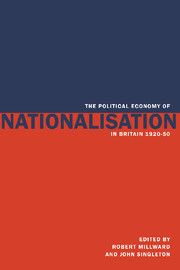Book contents
- Frontmatter
- Contents
- List of tables
- List of contributors
- Preface
- I Government and industry 1920–50
- 1 Industrial organisation and economic factors in nationalisation
- 2 Labour, the Conservatives and nationalisation
- II Case studies of industry organisation, performance and nationalisation
- III Government and the process of industrial change in the 1940s
- IV Review and Conclusions
- Index
2 - Labour, the Conservatives and nationalisation
Published online by Cambridge University Press: 07 May 2010
- Frontmatter
- Contents
- List of tables
- List of contributors
- Preface
- I Government and industry 1920–50
- 1 Industrial organisation and economic factors in nationalisation
- 2 Labour, the Conservatives and nationalisation
- II Case studies of industry organisation, performance and nationalisation
- III Government and the process of industrial change in the 1940s
- IV Review and Conclusions
- Index
Summary
Nationalisation was both a political and an economic issue. How, then, are we to disentangle the political from the economic variables accounting for the growth of the state sector in Britain? No two candidates for public ownership were exactly the same, and the political and economic cases put forward by the supporters and opponents of nationalisation differed from industry to industry. Clearly, all economic arguments for nationalisation had a political context and contained either an implicit or an explicit political message. If we accept McCloskey's view (1986) that economics is primarily a set of techniques for winning debates, we may never succeed in separating the economic from the political components of the nationalisation issue.
Recent research has stressed that nationalisation should not be treated in isolation from industrial policy in general. State intervention in business could take a number of forms, including the provision of technical assistance, the encouragement of industry-level planning, and the use of direct controls over the allocation of inputs. Nationalisation stood at one end of the continuum of options from which governments could select their policies for dealing with industrial problems (Mercer, Rollings and Tomlinson 1992). This interpretation is unobjectionable, although it does not alter the fact that nationalisation was a particularly radical form of industrial intervention. Moreover, the state in Britain was prepared to resort to nationalisation more readily than governments in some other countries, such as the United States and Canada (Grant 1989). Given that there was something very distinctive about the public ownership option, this chapter seeks to examine the politics of nationalisation in Britain from 1918 to 1950.
- Type
- Chapter
- Information
- Publisher: Cambridge University PressPrint publication year: 1995
- 5
- Cited by

